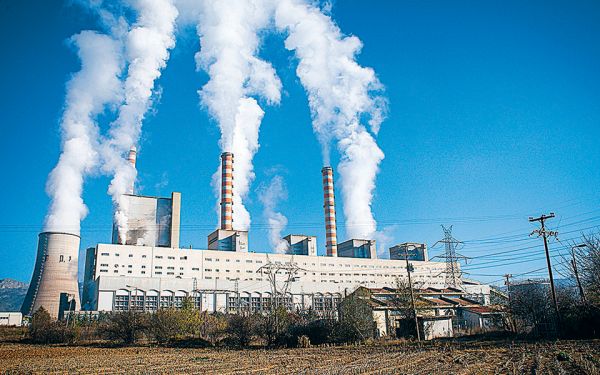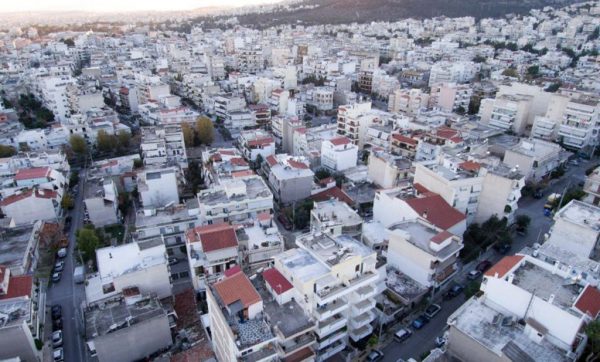
Pollution has no borders. It does not observe imaginary lines or dividers on the map. This is demonstrated by the new report of Bankwatch and the Center for Research on Energy and Clean Air on the consequences of the operation of 18 lignite power plants in the countries of the Western Balkans, which is presented today by OT.gr.
For the three years 2018-2020 alone, exceeding the limits on pollutants released by lignite plants in Bosnia and Herzegovina, Kosovo, Montenegro, northern Macedonia and Serbia are blamed for the deaths of 12,000 people, including 7,000 in EU countries and 240 deaths in Greece only for 2020. The country that suffered the most from these emissions excesses was Italy, with 605 deaths, followed by Serbia.
The health costs in the EU countries due to these breaches in the Balkans are also huge, estimated at between 4.4 and 8.9 billion euros for 2020. At the country level, the EU countries bordering the Western Balkans, such as Italy, Greece, Croatia, Hungary and Romania, have the greatest burden on the health sector from cross-border pollution.
However, when other parameters affected by pollution are added to the mathematical models of the researchers – in addition to citizens’ health care and national health systems – such as reduced productivity, then for 2020 the cost due to the excesses of pollutants released by the Coal mines in the Western Balkans are estimated at 6 to 12.1 billion euros. In Greece the cost reaches 847 million euros. It is followed by Italy with about 3 billion euros, Serbia with 1.7 billion euros, Hungary with 1.5 billion euros and Romania with 1.3 billion euros.
The study
In particular, the study demonstrated, inter alia:
· The 18 lignite plants in the Western Balkans in 2020 exceeded the permissible limits on sulfur dioxide (SO2) emissions by 6.4 times. In fact, their emissions were 2.5 times higher than the total emissions of the 221 EU lignite and coal units.
· Lignite power plants in the Western Balkans are responsible for 19,000 deaths, from 2018 to 2020, of which 10,800 in EU countries and the rest in the Western Balkans. The 12,000 deaths (out of 19,000) come from exceeding the emission limits in the same period, proving the disastrous consequences of the violation of the legislation in force in the Balkan countries, which, remarkably, falls far short of its strictness in the EU.
· EU countries import 8% of the electricity produced by the 18 lignite plants in the Western Balkans. During the three years 2018 – 2020, out of the 27 EU member states, Greece is the second largest importer of electricity (with 7.3 TWh). First was Croatia with 10.2 TWh, followed by Hungary and Romania.
Hourly data on the amount of electricity transmitted through the electricity transmission networks and the hourly energy mix of each country were used to calculate the coal-fired energy exported from the Balkans to the EU. Thus, in the period 2018 – 2020 the EU imported 25 TWh (terawatt hours) of electricity, which corresponds to 8% of total coal energy production in the Western Balkans.
However, the researchers of the report noticed something paradoxical. Although EU electricity imports from the Western Balkans account for only a minimum of 0.3% of total EU electricity consumption, the impact of gaseous emissions is extreme. That is, SO2 emissions corresponding to these imports account for 50% of total emissions from all EU lignite plants by 2020. This is because energy production in the Western Balkans emits about 300 times more SO2 than plants in the the rest of the EU.
It is noteworthy that North Macedonia and Montenegro have pledged to become completely independent of lignite by 2027 and 2035 respectively. However, the other countries, especially Serbia and Bosnia, which also have the lion’s share of lignite electricity generation in the Western Balkans, have not made a similar commitments.
“It is clear that the EU must take action to effectively protect the health of its citizens. It is necessary to ensure that environmental legislation also applies to electricity imported from the Western Balkans. In addition, in the context of the legislative package “ft for 55”, must impose significant taxes on carbon dioxide in imported electricity. However, all this cannot and should not be to the detriment of the citizens of the Western Balkans. For this reason, the EU must contribute in practice and with financial resources to the strengthening of the lignite areas in the Western Balkans, in order for the transition to the post-lignite period to take place in a socially just way “, comments analyst for think tank “TheGreenTank” Mr. Nikos Mantzaris speaking to OT.gr.
Impact on health and work
In 2020, the countries most affected by the unit’s high emissions in the Western Balkans were Italy, Greece and Serbia. And the impact on health is not limited to deaths as emissions excesses in 2018, 2019 and 2020 of all coal plants in Bosnia and Herzegovina, Kosovo, Montenegro, North Macedonia and Serbia are estimated to be associated with 130,000 days of asthma symptoms in children living in the EU. In addition, more than 11,000 children contracted bronchitis during the same period, more than 50% of all cases of bronchitis in children. In addition, hospital admissions due to cardiovascular and respiratory symptoms amounted to 3,000, of which 1,800 hospital admissions in the EU.
Excess emissions also affected productivity. An estimated 6 million working days were lost, with almost 3.5 million in EU countries and the rest in the Western Balkans.
Latest News

Capital Link Forum Highlights Greece’s Economic Resurgence; Honors BoG Gov Stournaras
Capital Link Hellenic Leadership Award recipient, Bank of Greece Gov. Yannis Stournaras, an ex-FinMin, was lauded for his pivotal role during Greece’s economic recovery

Tourist Spending in Greece Up by 14%, Visa Card Analysis Shows
Greece’s capital Athens emerged as the most popular destination, recording a 17% increase in transactions with Visa cards, surpassing even the cosmopolitan island of Mykonos.

Inflation in Greece Unchanged at 2.4% in Nov. 2024
The general consumer price index (CPI) posted a 0.4% decrease in November compared to the previous month

2024 Christmas Holidays: Extended Shop Hours Schedule
The 2024 Christmas Holidays extended shop hours schedule commences on Thursday, December 12 and runs until the end of the year.

ELSTAT: Seasonally Adjusted Unemployment Down in October
The number of employed individuals reached 4,284,694, an increase of 67,723 compared to October 2023 (+1.6%) and 22,002 compared to September 2024 (+0.5%).

Greek PM’s Chief Economic Adviser Resigns
In the post on his Facebook page, Patelis did not disclose the reasons that led him to step down.

“Masdar Invests in the people of Greece and in the vision of TERNA ENERGY”
Four messages from the CEO of Masdar, the Arab renewable energy giant, after its acquisition of 70% of TERNA ENERGY

Lloyd’s List Greek Shipping Awards 2024: Honors for leading companies and personalities in the Greek shipping sector
20 awards presented at the 21st annual Lloyd's List Greek Shipping Awards

Syria’s Bashar al-Assad, His family Granted Asylum by Russia
Reuters also reported that a deal has been struck to ensure the safety of Russian military bases in the war-ravaged country

Greece to Introduce Artificial Intelligence into Its Education System
Currently, Greece is taking its first steps to bring AI into classrooms through the AI4edu program, which is being co-funded by the European Union















![Χειμερινή εξοχική κατοικία: Οι Ελληνες γυρνούν την πλάτη παρά την πτώση των τιμών [γραφήματα]](https://www.ot.gr/wp-content/uploads/2024/12/Capture-19-90x90.jpg)










![Εμπορικά ακίνητα: Ασταμάτητη η άνοδος των ενοικίων – Πόσο αυξήθηκαν σε Αθήνα, Θεσ/νίκη και υπόλοιπη Ελλάδα [πίνακες]](https://www.ot.gr/wp-content/uploads/2021/05/grafeip-600x399.jpg)














 Αριθμός Πιστοποίησης Μ.Η.Τ.232433
Αριθμός Πιστοποίησης Μ.Η.Τ.232433